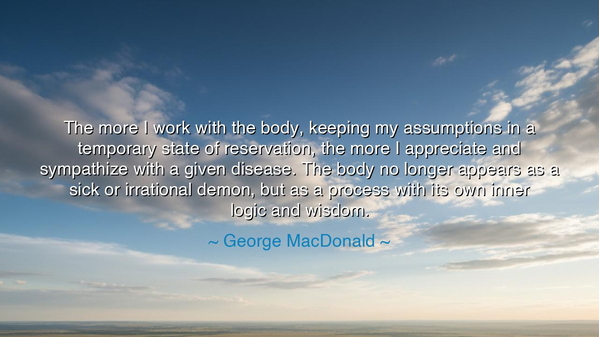
The more I work with the body, keeping my assumptions in a
The more I work with the body, keeping my assumptions in a temporary state of reservation, the more I appreciate and sympathize with a given disease. The body no longer appears as a sick or irrational demon, but as a process with its own inner logic and wisdom.






George MacDonald, with the heart of a mystic and the eye of a healer, declares that when we approach the body with humility, laying aside our arrogant assumptions, even disease itself ceases to appear as a cruel demon. Instead, it reveals itself as a process, governed by its own inner logic and wisdom. This is no trivial insight: it is the turning of fear into reverence, of judgment into understanding. He teaches that within the very struggles of flesh lies a hidden order, and even suffering can be a teacher if one listens deeply.
In the ancient world, the body was often viewed with suspicion, as a prison of the soul or a battlefield of hostile forces. Yet the wise among them—such as Hippocrates, the father of medicine—understood that illness was not punishment from the gods, but imbalance within the natural order. He sought not to condemn disease, but to read it, as one reads the winds or the stars. So too does MacDonald remind us: to see rightly, we must sympathize with the body’s pain, for even in its weakness, it speaks a language of truth.
History offers many examples of this reverent view. Consider Louis Pasteur, who unveiled the hidden causes of infection not to vilify nature, but to work with it. By listening to the subtle logic of unseen organisms, he transformed terror into knowledge, and knowledge into healing. He did not curse the body as a betrayer; he sought to aid it in its struggle. In this, his wisdom echoes MacDonald’s: the body is not irrational, but profoundly wise, if only we learn to understand its voice.
This teaching is also a call to compassion. When we see the sick not as cursed or broken, but as souls engaged in a process of struggle, our hearts are moved to sympathy. The ill are no longer outcasts of fate, but companions walking through a hidden order of trial and renewal. To stand beside them is to affirm that suffering, though hard, is not meaningless.
Let the generations remember: the body is no enemy. Its pains, its weaknesses, even its diseases, are part of the great script written into creation. To despise them is to despise the wisdom of life itself; to honor them is to glimpse the unity of flesh and spirit. For the body speaks, even in affliction, with a voice of hidden truth—and the wise man listens, not with fear, but with reverence.






TVTuong Vi
I’m intrigued by the philosophical depth in this observation. Viewing the body as a system with its own intelligence changes the dynamic of medical practice. Could this mindset foster more patience and creativity in research and treatment? It also raises questions about how practitioners balance respect for the body’s logic with the need to intervene. Perhaps the art of medicine lies in discerning when to guide and when to observe.
HQPham Huong Quynh
This quote makes me reflect on the distinction between treating symptoms and understanding processes. MacDonald implies that sympathy for disease comes from recognizing the body’s internal wisdom. How might this influence preventative medicine or rehabilitation practices? Perhaps respecting the body’s signals and logic could lead to treatments that align more closely with natural healing processes rather than imposing purely mechanical interventions.
LTNam Luong Thanh
What strikes me is the idea of holding assumptions in a ‘temporary state of reservation.’ It suggests that even experts must remain humble in the face of complex biological systems. I’d like to ask whether this approach could improve patient care by fostering curiosity and reducing bias. Could the act of listening and observing carefully allow practitioners to understand conditions more profoundly than rigid adherence to protocol?
HHLu Huy Hong
I find this statement fascinating because it challenges the common adversarial view of disease. Instead of seeing illness as a battle, MacDonald frames it as a process with its own logic. Does this imply that modern medicine could benefit from viewing the body as a partner rather than a battlefield? I’m curious how this philosophy intersects with holistic or integrative approaches that respect the body’s inherent intelligence.
KKynn
This quote makes me think about the importance of empathy in medicine. George MacDonald highlights how suspending assumptions allows one to see the body as an intelligent system rather than an enemy. I wonder if this perspective is applicable beyond disease treatment—could approaching mental health or even social issues with the same mindset lead to better understanding and compassion? It seems that observation without judgment can reveal deeper truths.